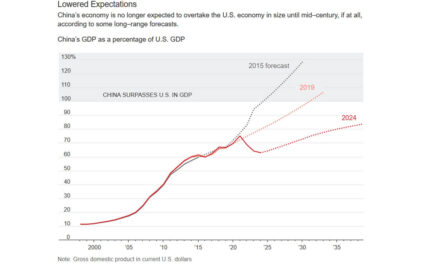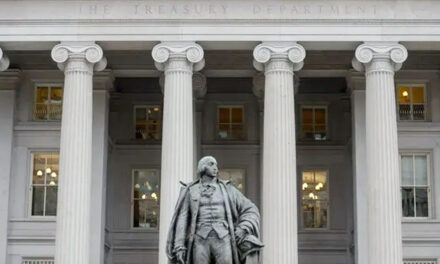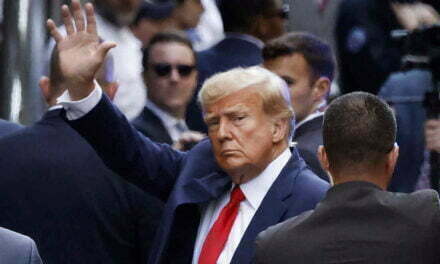
SCOTUS: Democrats Do NOT get Trump Tax Returns
The Supreme Court on Thursday issued a two-part ruling regarding President Trump’s financial records and those who seek to make them public.
In a vote of 7-2, justices rejected Trump’s claim that the President of the United States is immune from investigations while in office and upheld Manhattan District Attorney Cyrus Vance’s ability to subpoena Trump’s accounting firm (Mazars USA) to produce his tax returns.
Vance is seeking Trump’s financial records in connection to criminal grand jury proceedings regarding alleged hush money payments to former porn star Stormy Daniels and former Playboy Playmate Karen McDougal. Both women claim to have had extra-marital affairs with Trump.
The Supreme Court’s ruling sends the issue back to a district court in New York, which could eventually force Mazars to obey a subpoena.
“They basically said that the President is not immune from participating in a criminal judicial proceeding. He cannot use his office as some sort of excuse to not participate or respond to subpoenas,” says Fox News correspondent and attorney Katie Cherkasky. “However, that does not mean that his records will be released immediately. In fact, he has the opportunity just like any other individual to fight the legitimacy of the subpoenas and to attempt to get those quashed.”
The High Court’s 7-2 vote also confirmed that Congress has some degree of power to demand personal information from POTUS, but that the president does enjoy special immunity.
This decision applies to the case of Trump v. Mazars – in which three House committees seek Trump’s financial records on suspicion that he exaggerated or underreported his financial holdings and/or has financial ties to Russian oligarchs.
The majority opinion outlines new limits on Congressional investigation into the president, a major win for Trump: “Congressional subpoenas for the President’s information unavoidably pit the political branches against one another,” wrote Chief Justice John Roberts. “Without limits on its subpoena powers, Congress could ‘exert an imperious controul [sic]’ over the Executive Branch and aggrandize itself at the President’s expense, just as the Framers feared.”
Courts must “carefully assess whether the asserted legislative purpose warrants the significant step of involving the President and his papers,” he continues. They must “insist on a subpoena no broader than reasonably necessary to support Congress’s legislative objective.”
Furthermore, lawmakers must be hesitant to allow any investigation that “raises sensitive constitutional issues, such as legislation concerning the Presidency” and they must “be careful to assess the burdens imposed on the President by a subpoena.”
Again, the decision ultimately sends the issue to a lower court to further investigate whether this is a separation of powers issue. This means that if Trump is forced to reveal his financial information to Congress, it won’t happen any time soon.
“The Supreme Court is essentially saying, ‘We’re not going to get involved with the other two branches of government; as the third branch, we’re not going to mediate this fight right now between the Executive Branch and the Legislative Branch. Again, it’s going back to another court so there’s no production of any records at this point,” explains Fox News corespondent David Spunt.
Despite the obvious advantages to his presidential campaign, Trump described the Supreme Court’s ruling as “political prosecution” and complained about having to “keep fighting in a politically corrupt New York.”
Trump lawyer Jay Sekulow was more optimistic, noting that the Court’s decision to send both issues to lower courts effectively keeps Trump’s records private until after the November election. “We will now proceed to raise additional Constitutional and legal issues in the lower courts,” said Sekulow.
It’s important to note that both Supreme Court Justices nominated by Trump (Brett Kavanaugh and Neil Gorsuch) sided with the majority opinion. Justices Samuel Alito and Clarence Thomas dissented in fears that decisions made about Trump would affect future presidents – perhaps even give them the power to refuse a formal request from Congress.
Author’s Note: The Dems have been trying to force Trump to release his tax returns and other financial information since day one. And while the Court’s decision may end up forcing him to do so, it will delay the release of this information for months – perhaps years – meaning the Dems won’t get their hands on his tax returns until well after the election.



























!!DEMONCRAPS!!! STILL LOOKING FOR A CRIME!!!
Finally, someone other than me read the decisions in full.
By what stretch of the imagination was it illegal for Trump to pay hush money to Karen McDougal or Stormy Daniels?